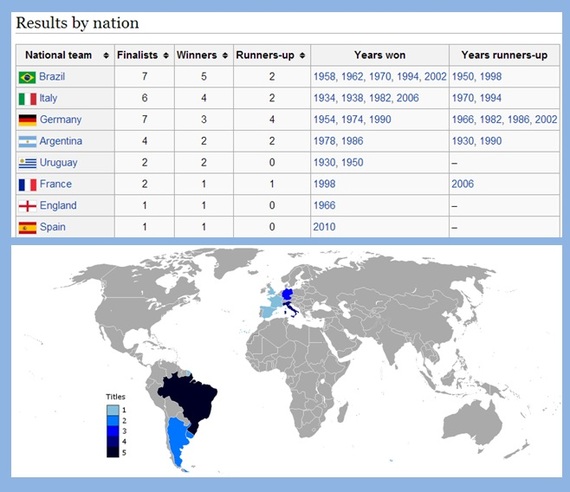The real lesson England and America should take away from this World Cup is one of the golden un-rules of life in Latin countries, one which Brazilians have taken to a whole other level: Jeitinho.
Wikipedia offers this correct etymology:
"The word 'jeitinho' comes from the expression dar um jeito, literally 'find a way.' It implies the use of resources at hand, as well as personal connections, and creativity. Como é que ele conseguiu os bilhetes? How did he manage to get those tickets? Ele deu um jeito or in English, 'He found a way.'"
Why do Latins win at Jeitinho? Maybe it's a by-product of Catholic rebellion, maybe it's the fresh memory of military governments and the urge to be free, maybe it's the heat, but whatever it is, the English and Americans should wake up to it.
While this sense of "finding a way" comes out in all walks of life and has made its way into stereotypical cultural themes (the standard joke about Italian airports), nowhere is it more easily observable than at the World Cup.
It comes through in everything about the game, the style of play, the coach's choice of clothing, even the signifiers used -- in Brazil it is simply "the beautiful game."
The winners of the most important sports title in human history are not the winners of the economic or population races. Goldman Sachs and Nate Silver equally can't figure it out. I submit it is this jeitinho.
The disappointing early ouster of England from the Group Stage and the showdown between the two best players on the American and Portuguese squads were two crystallizing examples of this disconnect between English and American mindsets and our Latin brethren.
Rooney, and likely his English countrymen, cannot even find the right word to use when describing this cultural conflict. The fact that we don't have an English equivalent for jeitinho is in fact very telling.
Not only do we not feel it, we do not even know how to talk about it. Rooney resorts to calling it "playing nasty," and it's this pejorative way of thinking about it that keeps the U.S. and England out of the winner's circle.
Another example, juxtaposing Michael Bradley with Cristiano Ronaldo in the U.S.-Portugal game. Both players missed easy scoring opportunities that would have secured their side's critical win. That isn't the problem, they each tried hard but came up short. That's soccer.
The crucial difference was how each played in the final seconds of the game. One did whatever it took to win, the other didn't.
Winners do what it takes to win. They have jeitinho -- they "find a way."
I worry that the lesson isn't sinking in. For example, instead of coming clean and saying he should have done anything and everything to kill the clock, Bradley insists that he has "no regrets."
Let's be crystal clear: When you are in that position with that much on the line, you literally do anything to kill the clock. I'm not saying he should've, but people who live by the jeitinho code might have even resorted to biting (yes, biting) -- (Suarez, a Uruguayan, would call it viveza criolla. Chiellini, the Italian he bit on the shoulder, would say "Sei pazzo?").
The passion and the drive that have been leading Latin countries to World Cup glory stem in part from this cultural concept of jeitinho. I hope we stay in Brazil after tomorrow's game, but if we don't, I at least hope some Brazilian jeitinho has rubbed off on our players.

